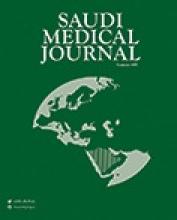Abstract
OBJECTIVE: To characterize the effects of regular Roselle ingestion on blood pressure and left ventricular hypertrophy (LVH) in patients with established moderate essential hypertension.
METHODS: This non-randomized quasi-experimental study was conducted in Kafr El-Shaikh, Egypt, for 8 weeks, from September 2012 to November 2012. The effects of a 4-week period of regular Roselle ingestion followed by a 4-week recovery period on systolic blood pressure (SBP), diastolic blood pressure (DBP), pulse pressure (PP), and heart rates (HR) was studied in 2 equal, gender- and age-matched groups (n=50 each; average age - 50±5 years) of normotensive subjects, and patients with moderate essential hypertension. Electrocardiographic assessments of LVH were also made prior to, and at the end of both treatment and recovery periods.
RESULTS: Pulse pressure (PP) significantly fell from baseline values by 10.9% (normotensive group [NG]), 21.2% (hypertensive group [HG]); SBP by 10% (NG), 19.6% (HG); DBP by 9.5% (NG), 18.7% (HG), and HR by 14.6% (NG), 17.1% (HG) by the end of week 4 of treatment. Following treatment cessation, SBP, DBP, PP, and HR returned to pretreatment levels over 4 weeks. Before intervention, none of the normotensive subjects, but 14 hypertensive patients showed LVH. However, Roselle treatment was associated with regression of LVH in 10 patients with only 4 patients showing LVH after 4 weeks of treatment. This became 10 patients 4 weeks after ceasing treatment.
CONCLUSION: These findings empirically suggest favorable cardiovascular effects of Roselle in patients with established moderate essential hypertension.
- Copyright: © Saudi Medical Journal
This is an open-access article distributed under the terms of the Creative Commons Attribution-Noncommercial License (CC BY-NC), which permits unrestricted use, distribution, and reproduction in any medium, provided the original work is properly cited.






